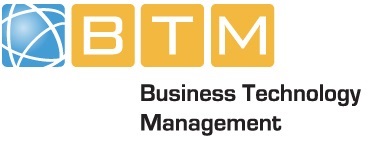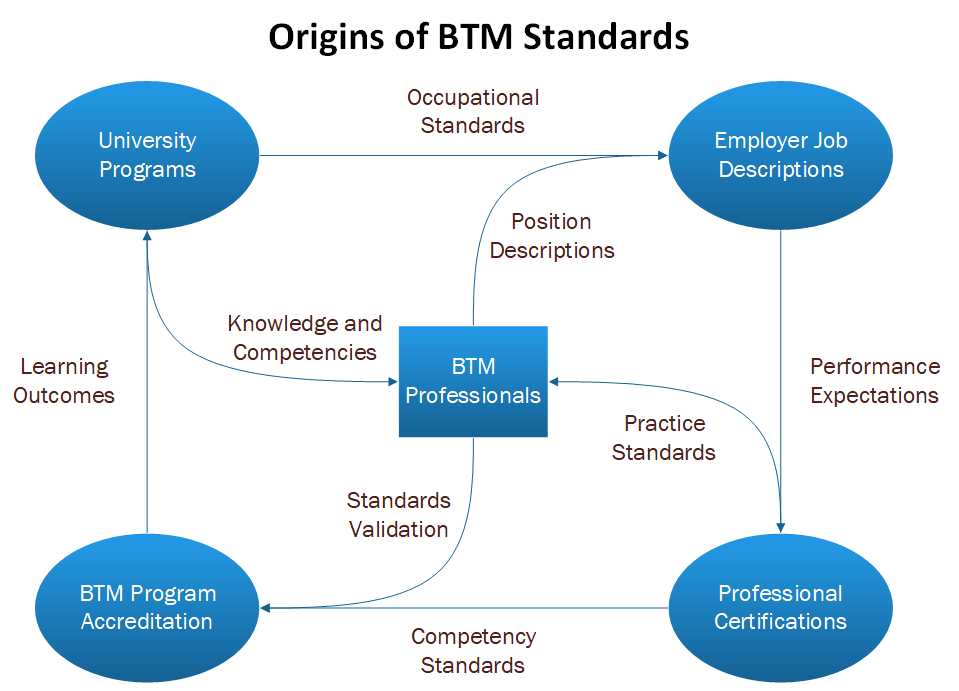Accreditation ensures better integration of BTM Learning Outcomes.
BTM standards have been developed in Canada since 2009, and offered in both Canada and USA. Their origins are from a wide consultation of academics and industry leaders. They were revised in 2016, and are under redevelopment in 2023.

What distinguishes BTM Accreditation from other credentials?
BTM does not intend to replace, but instead seeks to build upon, several competency frameworks that cover various parts of, and can be useful for, digital leadership program development.
Our community members make regular references to existing curricula recommendations, such as ACM/AIS Information Systems (IS) 2020 Curriculum, and industry-developed competency models, such as SFIA, as well as Bodies of Knowledge (BOK) linked to professional certifications.
However, BTM Accreditation takes a different approach by providing a high-level synthesis of digital leadership competencies, as opposed to an exhaustive and in-depth coverage. Competencies are not only assessed in their “discrete/unitary” dimensions, but especially in relations to each others within the scope of a logical framework.
As well, BTM is primarily a practice-oriented assessment, where BTM Learning Outcomes are conceived as the “minimum profile” for successful practice, as requested by industry leaders during consultations. As such, BTM Accreditation is focused on confirming that program alumni will be able to meet practice abilities expected by hiring managers, and meet minimal requirements for digital leadership and team roles.
How can your program achieve BTM Accreditation?
- For Canada: contact the BTM Council for Canada, administered by CIPS.
- For USA and rest of the World: contact the BTM Global Council executive group, who will direct you to your respective National BTM Council.
Which programs can be BTM Accredited?
Until today, only undergraduate programs have been BTM accredited, given the initial focus of the intiative launched in Canada since 2009:
- Associate Degree: Most 2-years post-secondary degree granted by Community Colleges can cover all BTM Learning Outcomes but will lack specialization and the depth of mastery will be limited given the hours and type of learning contents used.
- Bachelor Degree: Most 3-years or 4-years undergraduate degrees granted by Colleges, Institutes, or Universities cover all BTM Learning Outcomes but will also provide solid disciplinary foundations in business, computing, and/or engineering.
- Undergraduate Certificate: These 1-year credentials correspond typically to a Bachelor Major in BTM, with at least 10 core courses, typically the same as in the Bachelor, covering all BTM Learning Outcomes.
Once the ongoing consultation has concluded, the BTM Global Council will develop new standards for graduate degrees to be BTM accredited:
- Graduate Diploma: These 1-year credentials, with at least 10 courses that are typically the same as in the Masters, require a prior mastery or certification on BTM Learning Outcomes, and go beyond by focusing on advanced leadership functions such as Digital Innovation, Transformation, and Entrepreneurship (DITE), aligned with roles at the higher levels of digital governance.
- Masters Degree: Any 2-years graduate degree, with at least 15 courses of which at least 10 focused on BTM, will typically seek the same objectives and courses as the Graduate Diploma, combined with an Essay, Internship, and/or Thesis.
- Doctorate Degree: Any doctoral program will involve at least 1-year and between 5-10 courses of which half focused on BTM, and a prior degree making the candidate BTM certified, along with comprehensive exams of which one topic is BTM, and a thesis classified within the scope of BTM research.
Why are Continuing and Professional Education (CPE) programs not BTM accredited?
BTM Accreditation targets exclusively degree-granting programs developed and offered by state-licensed post secondary educational institutions, along with the certificates and diplomas they grant to their students and are built with the same courses as these degree programs, providing the same scope and rigour of learning.
Continuing and Professional Education (CPE) programs are of a different nature. A debate took place in 2016 on whether they could be considered for BTM accreditation, but the team voted not to do so. Any training that is not degree-granting or degree-courses related will be too diverse in terms of objectives, hours, structure, contents, learning activities, learning assessment, and coverage of BTM Learning Outcomes.
There is hope that some IT professional associations and certification bodies may help BTM Forum develop a CPE recognition process. This would benefit their members by enabling a bridge between their existing professional credentials and BTM Certification. This would ensure coverage of a great part of BTM Learning Outcomes, and serve as a stepping stone to be combined with parts of an existing BTM degree.
A group of BTM Accredited state-licensed post secondary educational institutions will then be invited to work with this organization and help develop a more innovative pathway involving CPE training credentials. It is likely that this would involve a prior review by the educational institution to grant degree-credits for prior training and achievements, and CPE recognition by BTM Forum would make this process more seamless.
What are the steps to become a BTM Accredited program?
- Step 1: Read the BTM Accreditation Criteria 2.0 to understand the scope of BTM Learning Outcomes.
- Step 2: Read the detailed BTM Accreditation Criteria for 3 bachelor programs: BTM Standard, BTM Data Analytics, and BTM Financial Services. Also available in Excel (.XLSX) format to facilitate reuse in your program redesign efforts.
- Step 3: Contact the secreteriat of your relevant National BTM Council, for Canada or for Rest of the World.
- Step 4: Get from your contact the latest version of fees and procedures, as they are under review in the year 2023.
- Step 5: Sign an agreement with the secreteriat of your relevant National BTM Council to initiate the process.
- Step 6: Read the Accreditation Panel Member Guide used in review of applications for Recognition/Accreditation of Business Technology Management (BTM) Programs.
- Step 7: Perform a mapping of your program courses to the 70 accreditation criteria, typically an opportunity to engage your program faculty, students, and other stakeholders.
- Step 8: Fill-out the BTM Accreditation Questionnaire as a self-evaluation to prepare for the accreditation visit and assessment, and compile the necessary courseware, data, and witnesses.
- Step 9: Share your self-assessment materials with the secretariat, and host the BTM Accreditation Panel Visit on your campus, ensuring all facets of your program are reviewed.
- Step 10: Revise and confirm your agreement with the BTM Accreditation Status Report produced by the Panel, which will then be submitted for a vote by the accreditation body.
- Step 11: Address any questions by the National BTM Council secretariat and members, before, during, or after council sessions in preparation for a vote on your program candidacy.
- Step 12: Once your National BTM Council has accepted your candidacy, sign the accreditation agreement with the relevant secretariat, pay the fees as agreed initially and invoiced to your institution, and begin program transition, including BTM branding.
Program Faculty – Confirm Interest in BTM Accreditation
Please fill out our BTM Survey to register existing BTM programs and inform us of your interest or comments regarding BTM accreditation.



